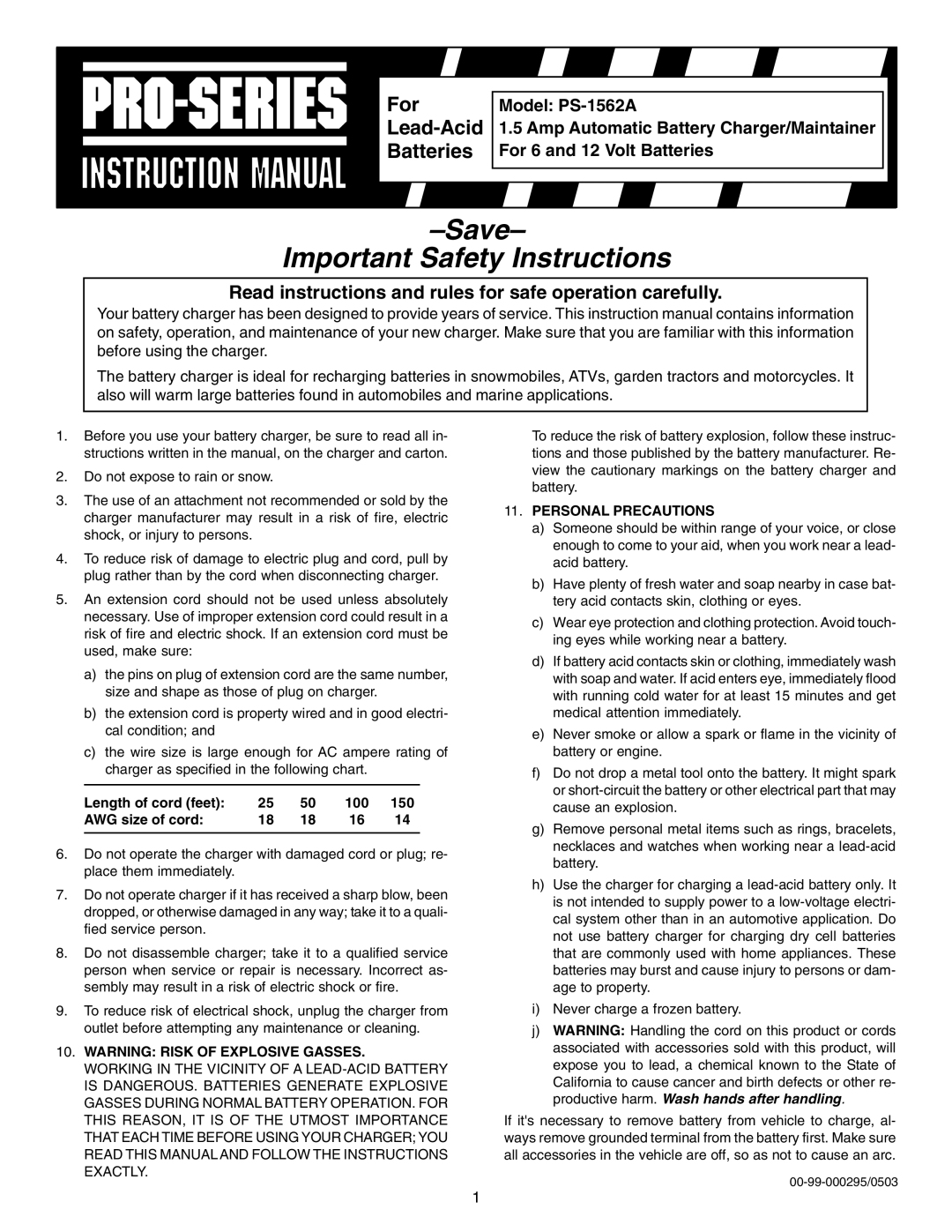
For | Model: |
1.5 Amp Automatic Battery Charger/Maintainer | |
Batteries | For 6 and 12 Volt Batteries |
INSTRUCTION MANUAL |
|
–Save–
Important Safety Instructions
Read instructions and rules for safe operation carefully.
Your battery charger has been designed to provide years of service. This instruction manual contains information on safety, operation, and maintenance of your new charger. Make sure that you are familiar with this information before using the charger.
The battery charger is ideal for recharging batteries in snowmobiles, ATVs, garden tractors and motorcycles. It also will warm large batteries found in automobiles and marine applications.
1.Before you use your battery charger, be sure to read all in- structions written in the manual, on the charger and carton.
2.Do not expose to rain or snow.
3.The use of an attachment not recommended or sold by the charger manufacturer may result in a risk of fire, electric shock, or injury to persons.
4.To reduce risk of damage to electric plug and cord, pull by plug rather than by the cord when disconnecting charger.
5.An extension cord should not be used unless absolutely necessary. Use of improper extension cord could result in a risk of fire and electric shock. If an extension cord must be used, make sure:
a)the pins on plug of extension cord are the same number, size and shape as those of plug on charger.
b)the extension cord is property wired and in good electri- cal condition; and
c)the wire size is large enough for AC ampere rating of charger as specified in the following chart.
Length of cord (feet): | 25 | 50 | 100 | 150 |
AWG size of cord: | 18 | 18 | 16 | 14 |
|
|
|
|
|
6.Do not operate the charger with damaged cord or plug; re- place them immediately.
7.Do not operate charger if it has received a sharp blow, been dropped, or otherwise damaged in any way; take it to a quali- fied service person.
8.Do not disassemble charger; take it to a qualified service person when service or repair is necessary. Incorrect as- sembly may result in a risk of electric shock or fire.
9.To reduce risk of electrical shock, unplug the charger from outlet before attempting any maintenance or cleaning.
10.WARNING: RISK OF EXPLOSIVE GASSES.
WORKING IN THE VICINITY OF A
To reduce the risk of battery explosion, follow these instruc- tions and those published by the battery manufacturer. Re- view the cautionary markings on the battery charger and battery.
11.PERSONAL PRECAUTIONS
a)Someone should be within range of your voice, or close enough to come to your aid, when you work near a lead- acid battery.
b)Have plenty of fresh water and soap nearby in case bat- tery acid contacts skin, clothing or eyes.
c)Wear eye protection and clothing protection. Avoid touch- ing eyes while working near a battery.
d)If battery acid contacts skin or clothing, immediately wash with soap and water. If acid enters eye, immediately flood with running cold water for at least 15 minutes and get medical attention immediately.
e)Never smoke or allow a spark or flame in the vicinity of battery or engine.
f)Do not drop a metal tool onto the battery. It might spark or
g)Remove personal metal items such as rings, bracelets, necklaces and watches when working near a
h)Use the charger for charging a
i)Never charge a frozen battery.
j)WARNING: Handling the cord on this product or cords associated with accessories sold with this product, will expose you to lead, a chemical known to the State of California to cause cancer and birth defects or other re- productive harm. Wash hands after handling.
If it's necessary to remove battery from vehicle to charge, al- ways remove grounded terminal from the battery first. Make sure all accessories in the vehicle are off, so as not to cause an arc.
1
